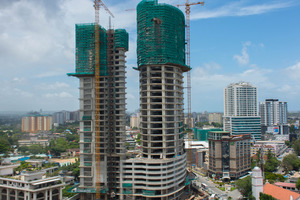- Infrastructure and Housing Drive Rapid Growth in Tanzania’s Construction Sector
- Ethiopia Breaks Ground on Africa’s Largest Aviation Construction Project
- Groundbreaking Ceremony Marks Start of Sh50 Billion MTRH Construction Project
- TANROADS-World Bank Alliance Powers Massive Road and Airport Upgrades Across Tanzania
- Kenya Breaks Ground on Sh5 Billion China-Kenya International Commerce Center in Nairobi
- Construction Begins on $2.15 Billion Uvinza–Musongati Railway Project
- Kenya Secures Chinese Funding for Sh5 Billion Nithi Bridge Reconstruction
- Construction Nears for ELCT Facility Backed by Samia’s 250 Million Boost
- KeNHA Kicks Off Construction of Major Kenya-South Sudan Road Project with AfDB Support
- Tanzania Government Allocates 100 Billion Shillings for Bridge Constructions in Lindi
Tanzanian economy expected to grow rapidly in 2018-19
 President John Magufuli's government has pledged to increase public investment in infrastructure projects, including a standard gauge railway, new roads, power plants and expansion of port facilities.
President John Magufuli's government has pledged to increase public investment in infrastructure projects, including a standard gauge railway, new roads, power plants and expansion of port facilities.
The President said that Tanzania plans to invest around $6 billion over the next five years in its agriculture sector, which is a mainstay of the economy.
The Minister for Finance of Tanzania said on Monday that the economy is expected to grow by 7.2 percent in 2018, up from around 7.1 percent last year, and the fiscal deficit will increase on the back of higher infrastructure spending.
Economic output in the East African nation is expected to be boosted by positive activity in the key mining, construction, transport and communications sectors.
In a special address to the parliament, finance and planning minister, Mr. Philip Mpango said that the inflation rate in 2018 would be curtailed within single digit levels. Tanzania's inflation stood at 3.8 percent year-on-year in April, slightly down from 3.9 percent a month earlier.
The overall budget is expected to rise to 32.5 trillion shillings ($14.29 billion) in the 2018/19 fiscal year, a 2.4 percent increase from the previous year, Mpango said. The private sector is expected to contribute 60 percent of the funds for the Agricultural Sector Development Programme Phase II, with the balance coming from the government and development partners.
Posted on : 25 Oct,2018
Buildmart is Africa's leading directory and market news website for the building and construction industry | Kenya | Tanzania | Rwanda | Ethiopia
Exhibitions In Africa
- 27th Buildexpo Kenya 2026
KICC, Nairobi, kenya
08 - 10, July 2026 - 11th Afriwood Kenya 2026
KICC, Nairobi, kenya
08 - 10, July 2026 - 11th LightExpo Kenya 2026
KICC, Nairobi, kenya
08 - 10, July 2026 - 10th Minexpo Africa 2026
KICC, Nairobi, Kenya
08 - 10, July 2026 - 27th Buildexpo Tanzania 2026
Diamond Jubilee Expo Center, Dar-es-Salaam, Tanzania
23 - 25, Sep 2026 - 10th Afriwood Tanzania 2026
Diamond Jubilee Expo Center, Dar-es-Salaam, Tanzania
23 - 25, Sep 2026 - 10th LightExpo Tanzania 2026
Diamond Jubilee Expo Center, Dar-es-Salaam, Tanzania
23 - 25, Sep 2026 - 10th Minexpo Tanzania 2026
Diamond Jubilee Expo Center, Dar-es-Salaam, Tanzania
28 - 30, Oct 2026





















